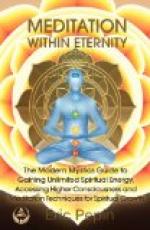“Gaze, till gazing out of gazing
Grew to BEING HER I gazed on,
She and I no more, but in one
Undivided Being blended.
All that is not One must ever
Suffer with the wound of absence;
And whoever in Love’s city
Enters, finds but room for one
And but in Oneness, union.”
These lines express that religious ecstacy which results from spiritual aspiration, or they express the union of the individual soul with its mate according to the viewpoint. In any event, they are an excellent description of the realization of that much-to-be-desired consciousness which is fittingly described in Occidental phraseology as “cosmic consciousness.” Whether this realization is the result of union with the soul’s “other half,” or whether it is an impersonal reunion with the Causeless Cause, The Absolute, from which we are earth wanderers, is not the direct purpose of this volume to answer, although the question will be answered, and that soon.
From whence and by whom we are not prepared to say, but the “signs and portents” which precede the solution of this problem have already made their appearance.
Christian students of the Persian mystics, take exception to statements like the above, and regard them as “erotic,” rather than spiritual.
Mahmud Shabistari employs the following symbolism, but unquestionably seeks to express the same emotion:
“Go, sweep out the chamber of your
heart,
Make it ready to be the dwelling-place
of the Beloved.
When you depart out, he will enter in,
In you, void of your_self_, will he display
his beauty.”
The “Song of Solomon” is in a similar key, and whether the wise king referred to that state of samadhi which accompanies certain experiences of cosmic consciousness, or whether he was reciting love-lyrics, must be a moot question.
The personal note in the famous “song” has been accounted for by many commentators, on the grounds that Solomon had only partial glimpses of the supra-conscious state, and that, in other words, he frequently “backslid” from divine contemplation, and allowed his yearning for the state of liberation, to express itself in love of woman.
An attribute of the possession of cosmic consciousness is wisdom, and this Solomon is said to have possessed far beyond his contemporaries, and to a degree incompatible with his years. It is said that he built and consecrated a “temple for the Lord,” and that, as a result of his extreme piety and devotion to God, he was vouchsafed a vision of God.
As these reports have come to us through many stages of church history and as Solomon lived many centuries before the birth of Jesus, it seems hardly fitting to ascribe the raptures of Solomon as typifying the love of the Church (the bride) for Christ (the bridegroom).
Rather, it is easier to believe, the wisdom of the king argues a degree of consciousness far beyond that of the self-conscious man, and he rose to the quality of spiritual realization, expressing itself in a love and longing for that soul communion which may be construed as quite personal, referring to a personal, though doubtless non-corporeal union with his spiritual complement.




